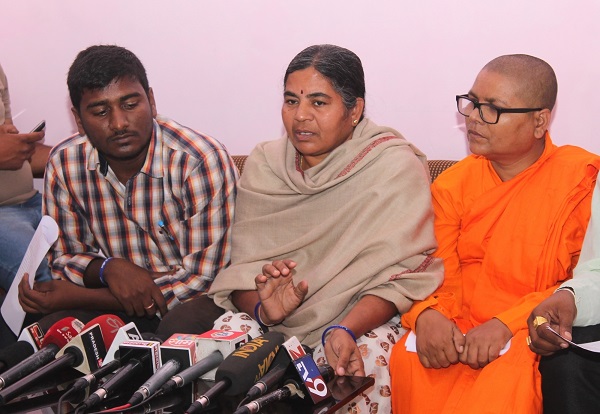New Delhi, Raising voice against caste discrimination, mothers of Payal Tadvi and Rohith Vemula, who committed suicide over alleged caste-based bias, moved the Supreme Court seeking its direction to put an end to discriminatory practices on the campus.
Abeda Salim Tadvi and Radhika Vemula, mothers of Payal Tadvi and Rohit Vemula respectively, sought a direction for strict compliance of UGC regulation of 2012, which restricts any kind of discrimination on campus.
Pointing to the rampant caste-based discrimination in higher education institutions, the petition said, “There have been several incidents of caste-based discrimination against members of the SC, ST community, which reflects flagrant non-compliance with the existing norms and regulations. These incidents are violative of the fundamental rights to equality, against discrimination, equal opportunity, abolition of untouchability and right to life.”
Radhika has vowed to fight the forces responsible for her son’s death.
The petition sought directions to all universities, including deemed ones and higher education institutions (HEIs), to ensure compliance with the UGC Equity Regulations in letter and in spirit.
Directions should be issued to all universities and HEIs to establish Equal Opportunity Cells on the lines of other anti-discrimination internal complaints mechanisms, they said.
Payal Tadvi, belonging to the ST community, had allegedly ended her life in her hostel at BYL Nair Hospital on May 22. She allegedly faced harassment from seniors following differences on the caste.
Vemula, a PhD scholar at the Hyderabad Central University, hung himself from a ceiling fan in a hostel room on January 17, 2016 allegedly due to disciplinary actions against him by the university.
They sought directions to universities and HEIs to regularly organise compulsory orientation courses, workshops and trainings for staff, administrators and students to create separate modules for sensitisation on caste.
“The internal complaints mechanism should include members from the SC, ST communities and independent representatives from NGOs or social activists to ensure objectivity and impartiality in the process and any such direction that the court may issue,” they said.
The mothers also sought direction to universities and HEIs to bring in public domain, through their websites, practices adopted to address the caste-based discrimination.










